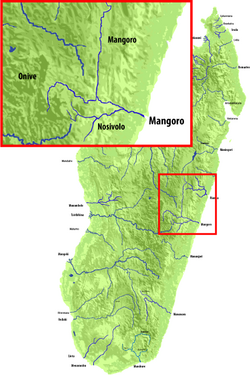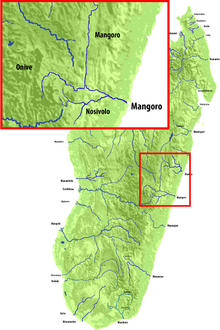The Nosivolo River is a river in eastern Madagascar and a primary tributary of the Mangoro River. It begins east of Fandriana.[2][3] The village of Marolambo, capital of the Marolambo District in the Atsinanana region, is located along the river at the junction with the Sandranamby River.
| Nosivolo River | |
|---|---|
 | |
 Nosivolo River | |
| Location | |
| Country | Madagascar |
| Physical characteristics | |
| Source | |
| • elevation | 1,800 m (5,900 ft) |
| Mouth | |
• location | Mangoro River |
• coordinates | 19°55′41.552″S 48°30′6.566″E / 19.92820889°S 48.50182389°E |
• elevation | 700 m (2,300 ft) |
| Length | 130 km (81 mi) |
| Basin size | 3,585 km2 (1,384 sq mi) |

| Designations | |
|---|---|
| Official name | Rivière Nosivolo et affluents |
| Designated | 17 September 2010 |
| Reference no. | 1916[1] |
It is an important river in Madagascar due to its biodiversity (including the cichlids Katria katria and Oxylapia polli, and Malagasy rainbowfish), which has spurred efforts to protect it. It was designed the first river Ramsar site in the country in 2010.[4][5][6]
The primary tributaries of the Nosivolo are the Sandranamby River (which joins near Marolambo), Sahadinta, Manandriana, and Sahanao.[6]
References
edit- ^ "Rivière Nosivolo et affluents". Ramsar Sites Information Service. Retrieved 25 April 2018.
- ^ "MADAGASCAR: New Livelihoods to Protect A River's Life". Global Issues, Inter Press Service. 2010-11-25. Retrieved 2013-03-05.
- ^ Campbell, Gwynn. David Griffiths and the Missionary "History of Madagascar", p. 488-89 (Brill 2012) (citing Aldegheri, Marius. The Rivers and Streams on Madagascar, in Battistini, Rene & G. Richard-Vindard (ed.), Biogeography and Ecology in Madagascar (1972))
- ^ (20 September 2010). Nosivolo is designated as Madagascar's first riverine Ramsar site, Conservation.org
- ^ (20 September 2010). Crystal-clear river becomes first in Madagascar to wins Ramsar protected status, WildMadagascar.org
- ^ a b Fiche technique du site Ramsar - ‘Rivière Nosivolo et affluents’ Madagascar[permanent dead link] (2010)(detailed Ramsar report on river)